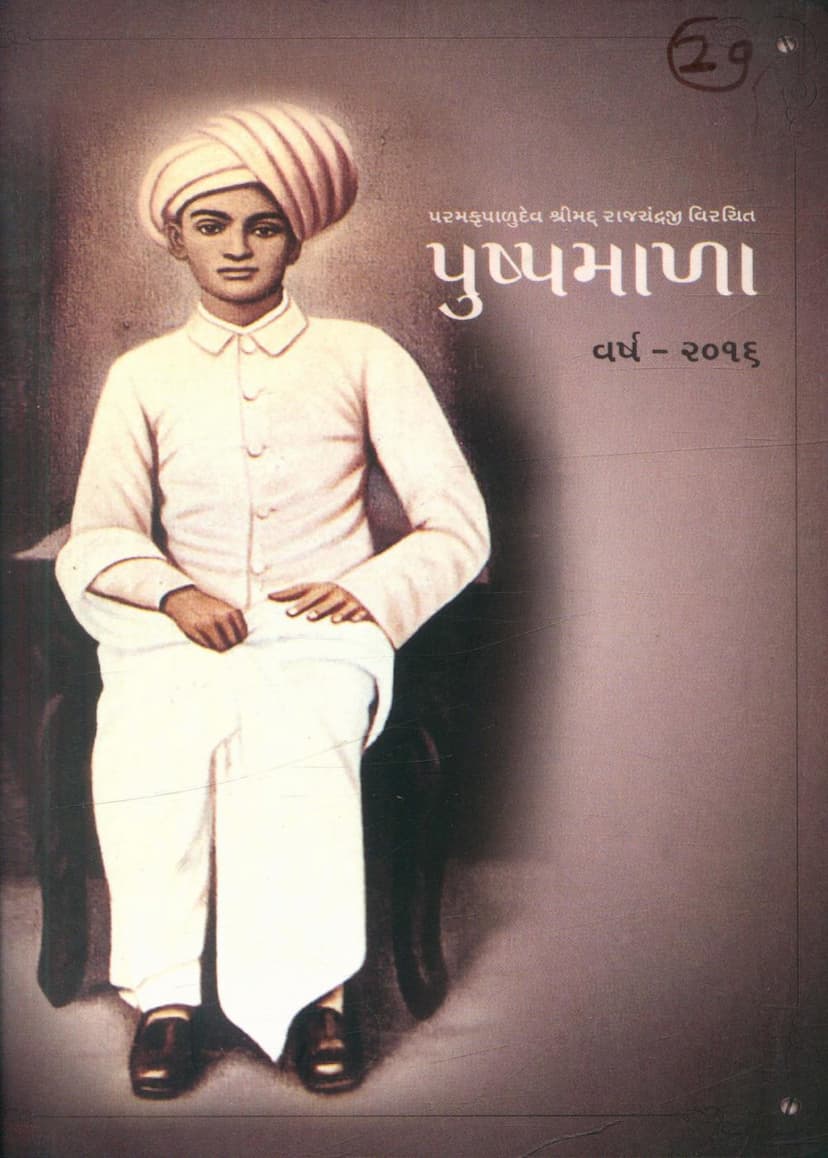Pushpamala
Added to library: September 2, 2025

Summary
Here's a comprehensive summary of the Jain text "Pushpamala" by Shrimad Rajchandraji, based on the provided pages:
Book Title: Pushpamala (Garland of Flowers) Author: Shrimad Rajchandraji (Paramkrup<bos> Shrimad Rajchandraji) Publisher: Shrimad Rajchandra Mission, Dharampur Translators: Prof. Pratapkumar J. Tolia & Smt. Sumitraben P. Tolia Year of Publication: 2016 (First Edition)
Overview:
"Pushpamala" is a collection of 108 philosophical and ethical verses, or "flowers," composed by the revered Jain saint Shrimad Rajchandraji before the age of seventeen. The book is presented as a "garland" of these insightful sayings, intended to guide individuals towards spiritual upliftment and righteous living. The core message emphasizes self-reflection, ethical conduct, and the pursuit of purity and detachment from worldly desires.
Key Themes and Messages:
The "Pushpamala" is structured as a series of daily reflections, urging the reader to contemplate various aspects of life and conduct each day. The verses offer guidance to individuals from all walks of life, regardless of their social standing or profession.
Here's a breakdown of the prominent themes and messages conveyed through the "flowers":
- Daily Reflection and Awakening: The text begins with verses that encourage waking up from both physical and spiritual slumber. It prompts reflection on the passage of time, urging the reader to make each day fruitful and to learn from past failures.
- Moral and Ethical Conduct: A significant portion of the "Pushpamala" focuses on ethical principles. This includes:
- Self-awareness and Repentance: Acknowledging and feeling ashamed of wrongdoings, and resolving not to repeat them.
- Righteous Actions: Encouraging good deeds and discouraging any act that causes harm to others.
- Honesty and Integrity: Emphasizing fair business practices and avoiding unjust accumulation of wealth.
- Purity and Self-Control: Promoting mental and verbal purity, and controlling desires and temptations.
- Kindness and Compassion: Advocating for equanimity towards all creatures and not causing harm or extracting work beyond capacity.
- Guidance for Different Roles and Professions: The verses offer specific advice tailored to various professions and life stages:
- Kings and Rulers: Advised to be mindful of their subjects' suffering, reduce taxes, and not to be complacent.
- Lawyers: Encouraged to reflect on the ethical implications of their profession.
- Wealthy Individuals: Urged to consider the purpose and use of their wealth.
- Artisans and Traders: Advised to avoid idleness and unjust practices.
- Youth and Old Age: Guidance for the young to focus on industry and celibacy, and for the old to contemplate death.
- Women: Encouraged to remember their duties towards their husbands, seek forgiveness for faults, and focus on their families.
- Poets and Power-Intoxicated: Reminded to be mindful of flattery and the rise and fall of power (citing Napoleon Bonaparte).
- Detachment and Spiritual Pursuit: The text consistently emphasizes the importance of detachment from worldly pleasures and possessions. True happiness is found in detachment (Vairagya).
- The Value of Time: Time is highlighted as precious and limited, urging the reader to utilize every moment wisely for spiritual progress.
- The Nature of the Body and Life: The transient nature of the physical body and the impermanence of life are underscored, prompting a focus on spiritual goals.
- The Importance of Religion and Virtues: While not endorsing any specific sect, the "Pushpamala" advocates for following the path that eradicates "worldly filth." Virtues like humility, contentment, love, and good conduct are celebrated.
- Overcoming Faults: A central theme is the identification and eradication of faults as the easiest path to spiritual progress.
- Devotion to the Divine: The verses encourage devotion to the Supreme Being as a means to good deeds and spiritual advancement.
Significance and Context:
The preface highlights the book's genesis from study circles and its translation into English to make Shrimad Rajchandraji's teachings accessible to a wider audience, including the youth and those who do not understand Gujarati. The text is presented as a testament to Shrimad Rajchandraji's profound spiritual insight at a very young age, with a quote suggesting the "Pushpamala" is a "witness to rebirth."
In essence, "Pushpamala" is a practical guide to daily spiritual living, offering concise and profound advice for cultivating ethical behavior, self-awareness, and a deeper connection to the divine. It serves as a spiritual garland woven with the pure and fragrant flowers of wisdom, intended to adorn the lives of seekers.